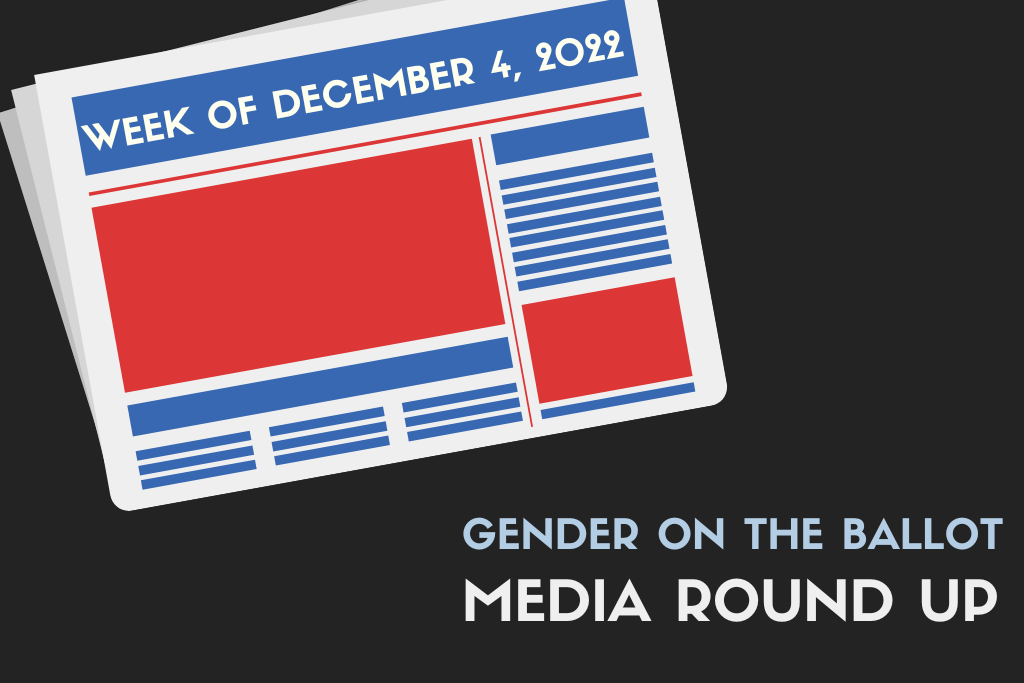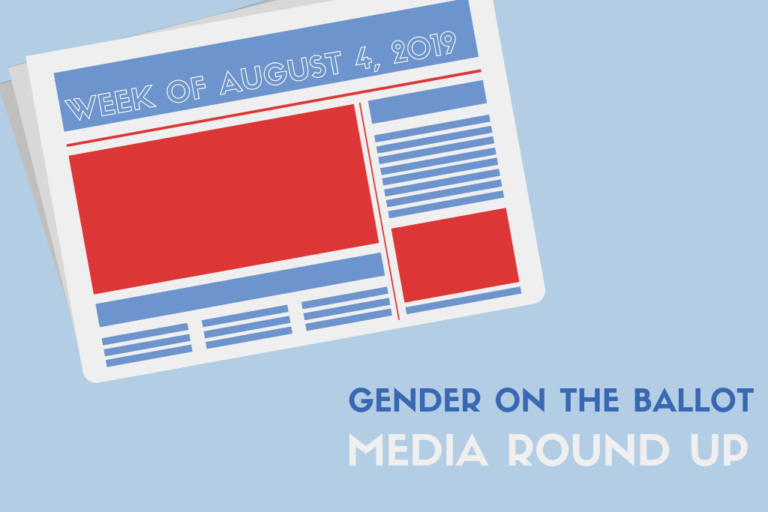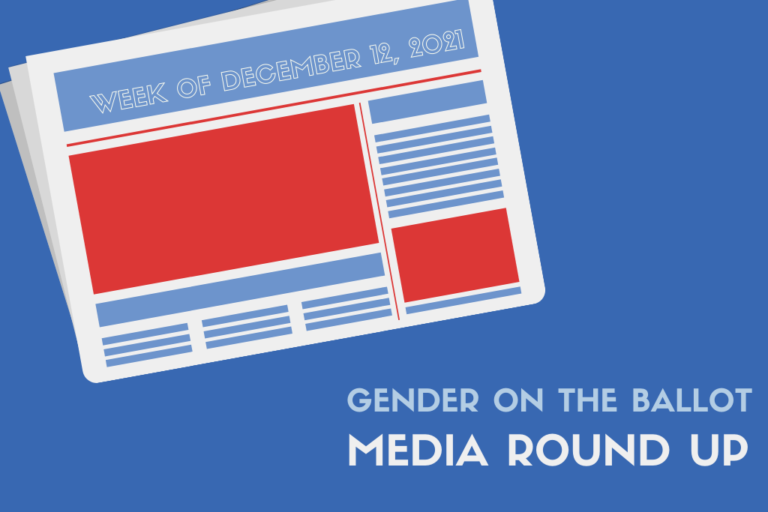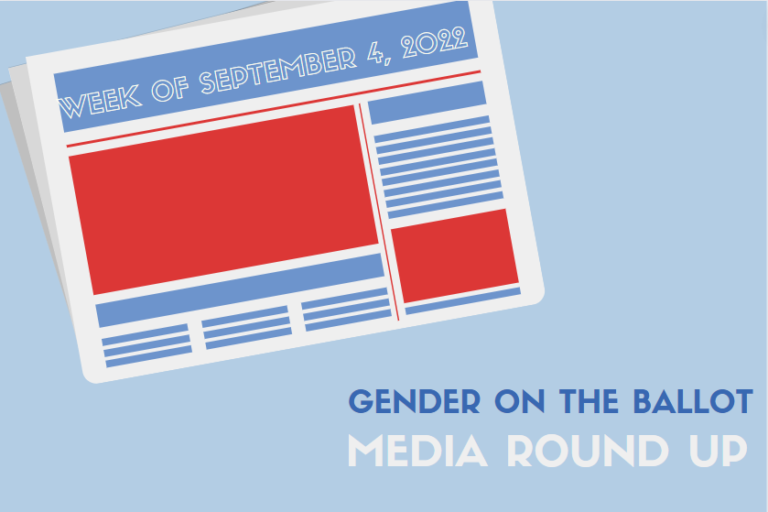Happy Friday! Welcome to our Media Round Up. Each week we’re collecting and sharing…
Media Round-Up: Week of December 4th

Happy Friday! Welcome to our Media Round Up. Each week we’re collecting and sharing our favorite gender + politics stories. Here’s what caught our eye this week:
This season, women can be found simmering in patriarchal systems — and fighting back
Randee Dawn, Los Angeles Times
This year’s Oscar season has multiple films featuring women challenging the patriarchal systems and ingrained misogyny in their lives. A few of these films starring women and their struggles with patriarchy include: “She Said,” a fictionalized story about a New York Times investigation, “God’s Creatures,” focusing on an assault in small town in Ireland, “The Woman King,” a historical retelling of women warriors, and “The Wonder,” a story about a young girl in 19th century Ireland that believes she no longer needs to eat. Director Maria Schrader is not surprised by the slew of films with similar themes, “‘We all experienced a moment of catharsis in the weeks and months following the publication of the NYT investigation,’ she writes in an email. ‘A dam of silence broke. Endless stories came out into the open from brave people, and it is only natural that their courage — and that sense of community and camaraderie — should serve as an inspiration for a new wave of storytelling based on modern-day heroines.”
Read the full story here.
Drug deaths among pregnant women hit a record high
Erika Edwards, NBC News
A new study finds that the number of pregnant women and new mothers dying from drug overdoses reached a record high in 2020. The new research published by JAMA on Tuesday highlights how substance use disorder harms pregnant people because they are less likely than others to seek help for drug dependency. According to researchers at Columbia University Mailman School of Public Health, of 7,642 people who died while pregnant between 2017 and 2020, 1,249 died of a drug overdose. During that time period, the rate of deaths caused by overdose for pregnant women nearly doubled from 6.56 to 11.86 per 100,000. Dr. Tricia Wright, an obstetrician and addiction medicine expert at the University of California, San Francisco, explains that she is unsurprised about the latest research on pregnant women and drug deaths because overdose deaths in general have increased.
Read the full story here.
How Some Of The World’s Most Powerful Women Are Fighting For Reproductive Rights
Maggie McGrath, Forbes
In June of this year, the U.S. Supreme Court overturned Roe v. Wade by a 5-4 vote, triggering state-specific bans on abortion to go into effect. Now abortion is illegal in about a dozen states, and restricted or unavailable in a dozen more. In response to the banning and restrictions on abortion in some states across the country, a number of women featured on Forbes’ “World’s 100 Most Powerful Women” list have devoted their resources in support of abortion access. . Some of the women include philanthropist MacKenzie Scott (No. 11) who donated $275 million to Planned Parenthood, Xiomara Castro (No. 5) who was elected Honduras’ first female president and campaigned for broadening abortion access in her country, and tv showrunner Shonda Rhimes (No. 93) who has featured fictional doctors on her show Grey’s Anatomy involved with abortion rights.
Read the full story here.
Kamala Harris to swear in Karen Bass as first female mayor of Los Angeles
Shania Shelton and Maeve Reston, CNN
Mayor-elect of Los Angeles Karen Bass will be sworn in by Vice President Kamala Harris in her inauguration ceremony taking place this Sunday. Bass will make history as the 43rd Mayor of Los Angeles because she will be the first female and first woman of color to hold the position. When Bass takes office on December 12th, the four largest cities in the country will all have Black mayors: in addition to Los Angeles–Eric Adams of New York City, Sylvester Turner of Houston, and Lori Lightfoot of Chicago. One of Bass’s main goals during her tenure as mayor is to solve the homelessness crisis in Los Angeles.
Read the full story here.
The Pandemic Has Created Two Very Different Kinds of Workplaces. That Especially Matters for Women.
Eleanor Mueller, Politico
The pandemic has presented many challenges for women in the workplace including layoffs, lack of childcare, and increased household work. Some companies have tried to ease the burden of the pandemic by offering greater pay and enhanced benefits such as generous paid family and medical leave, childcare benefits, and options to work remotely, which are heavily aiding women in the workforce. These increased benefits however are most common with high-paying, more flexible, white-collar jobs. Economists warn that despite the positives of increased benefits for women working white collar jobs, without policymakers leveling the playing field with legislation for universal childcare and paid leave which would benefit women working blue-collar jobs, racial and gender inequality will persist for decades to come.
Read the full story here.






